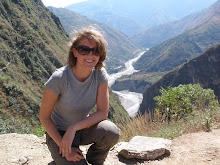Traveling alone can take some getting used to. For me, it took about 3 days. I went thought the phases of feeling completely isolated, then thinking about the people who care for me, then thinking about a certain person who used to care for me but now doesn't talk to me, then reverting back to beloved friends and family who are so far away, then getting upset that my solitary adventures had become me moping around--a viscous cycle that broke like a fever the morning of my second day in Jajce. I awoke with a blue sky in a room that was cold enough to keep me fully-clothed--hat included--under three blankets. I redressed as quickly as possible (not brave enough to attempt a shower), locked my door, and set out in search of the mid-week market, which was indecently easy to find as it was happening right across the street.
Round-faced men with turned-down noses too large for their faces and dark hair stood solidly in earth colored clothing beside decade-old truck beds filled with burlap sacks holding coarse grain. If you were not buying in bulk, you moved along the gravel packed ground. Rows of stalls selling hand-knitted socks, cheap rubber galoshes, instruments of house-cleaning, and Chinese manufactured clothing. Behind the stalls were men and women young and old. In a town that was still separated ethnically (Bosniak=Bosnian muslims and Bosnian Croats=Catholics who were indistinguishable to my foreign eyes), the weekly market brought people back together. Bow-legged old men in woolen jackets with black berets centered on their heads, pulled down enough to creat a comical look with the tab sometimes pointing straight up, walk carefully in small groups. Old country women squatting with their hands crossed in front of small bags of beans and handfuls of onions. I marvel at how they in that position, how and different their lives must be compared to mine. They look up at me expectantly, curiously, and defiantly--their wrinkled faces look me over in chorus and say, "we're not sure who you are, or where you come from, but as you can see we've brought our hard work to market, take advantage of it."
With this being communicated, they turn their kercheifed heqads back to one another, and I walk on. There are smiling women selling clumps of spring spinach, imported oranges, and the range of roots and fruits between. I point and reach for what I want and they obligingly follow me around with thionk plastic bags then resume their position behind the stand and weigh out my prouduce on old scales with counterweights of varying shapes, sizes, and luster. A man on crutches brushes past me, his one pant-leg pinned up past his knee. I wonder whether it was a result from a landmine (land mines were a common weapon in the Yugolslavic War and still remain scattered around the Bosnian countryside). Another man, this one with missing teeth, sells me half a dozen brown eggs from a plastic bucket. My final purches comes from two older ladies. It is the key to every meal, well to my every meal. Cheese. In this case, its fresh milk cheese; white and slightly sour in taste, the soft lump has been pressed into a circular mold, domed on top. They offer a slice to taste, then later a portion to buy.
I make my way back across the street to a freezing kitchen, where I create a farm fresh brunch that would rival my grandmother's in tastiness and Claire's in healthiness.
Tuesday, April 13, 2010
Subscribe to:
Comments (Atom)

